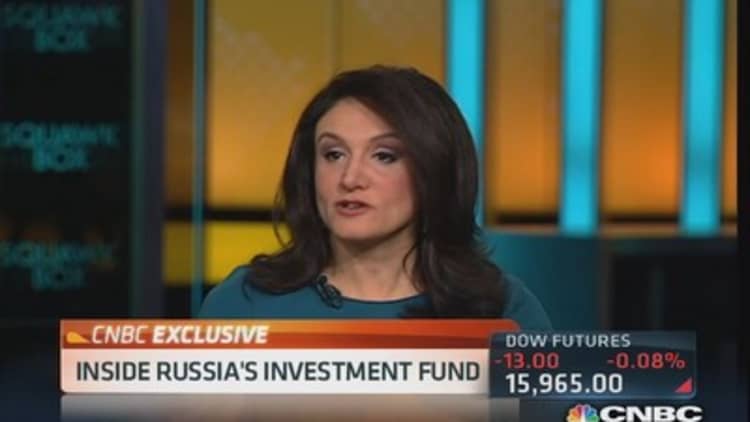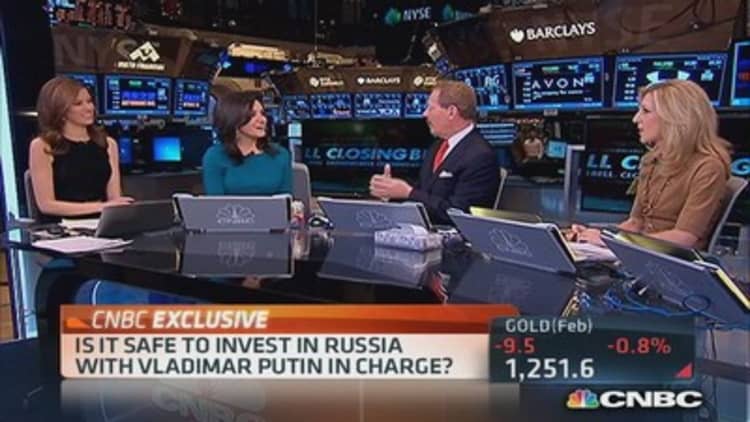Kirill Dmitriev is on a one-man mission to change Russia's image in the eyes of world investors. The 38-year-old graduate of Harvard and Stanford runs Russia's newest sovereign wealth fund—the $10 billion Russian Direct Investment Fund.
Unlike most sovereign wealth funds, which invest outside their country of origin (including two other Russian wealth funds that control more than $80 billion in assets) the fund that Dmitriev manages directs money back into Russia—co-investing in the country with the sovereign wealth funds of China, Abu Dhabi, Korea, Italy, France and Japan.
"Many people have misperceptions about Russia, and they feel the risk is greater than it really is," Dmitriev told CNBC. "So we put the (Russian) government's money alongside other investors' to make sure they are comfortable and understand that Russia can be an attractive investment destination."
Would-be investors in Russia have been scared off by developments such as the , as well as the battle between Hermitage Capital Management's Bill Browder and the Russian government's subsequent jailing of Browder's attorney Sergei Magnitsky, who died in prison.

When it comes to global benchmarks for the country's investment and business climate, Russia's ratings have improved—but they're still closer to the bottom than to the top. Transparency International ranks Russia 133 out of 176 in its corruption index (see graphic below). The Heritage Foundation lists it 144 out of 184 in its ranking of economic freedom. The World Bank says Russia is 92 out of 189 in ease of doing business. Watchdog organization Freedom House describes Russia's status as "Not Free."
Dmitriev acknowledged that Russia faces challenges "such as bureaucracy and corruption that the government is trying to solve." But he suggested that those will be fixed over time: "Capitalistic Russia is only 20 years old. So it is building institutions."
When it comes to actual business deals, Dmitriev said the country is focused on infrastructure and other investments related to boosting the middle class in Russia, which he said has tripled in size in the last five years.
"So for example, we invested in prenatal clinics, which are growing very quickly because private health care is increasing dramatically in Russia as people have money to spend on private health care," he said.
But Dmitriev's fund has also done deals in the financial sector, the technology sector and even in businesses such as movie theaters. As with any private equity fund, Russian Direct's exit strategies include initial public offerings, as well as sales to strategic buyers or longer-term investors. For example, in the case of toll roads, the fund will exit and let other investors step in when the fund knows cash flows are secure.
(Read more: The new Cold War: Russia eyes chilly Arctic in global energy play)
While very comfortable talking about private equity and investment, Dmitriev is less comfortable talking about politically sensitive topics such as and the extensive domestic powers held by President Vladimir Putin.
Asked about critics' complaints about Putin, Dmitriev defended his boss:
"They totally do not understand what President Putin is doing. Because he really brought stability and growth into a country that was torn by different business plans, that really had huge unemployment, was pretty much bankrupt," he said. He noted that Russia has grown into the world's sixth-largest economy "from being absolutely bankrupt" in only 13 or 14 years.
'Most Ukrainian goods are not competitive'

Pressed about the , Dmitriev acknowledged that the opinion of the Ukrainian people should be respected, but said they should also be careful of what they wish for. If the Ukrainians turn their back on Russia, with whom they now have many economic links, he asked, "Would they really want to have a complete collapse of the economy?"
Ukraine would suffer from the same challenge that Greece and Portugal faced, Dmitriev said: a lack of competitiveness.
"Most Ukrainian goods are not competitive. Many European groups would come in, and Ukrainian enterprises would not be able to compete with it," he said. "So it's just basic economics. High unemployment, more difficulties."
"Longer term, it may to lead to restructuring of the economy and to it being more competitive," he said, "but that's why I think Russia, (the) European Union and Ukraine need to work together to figure out a solution that is good short term, medium term and long term."
—By CNBC's Michelle Caruso-Cabrera. Follow her on Twitter @MCaruso_Cabrera.


